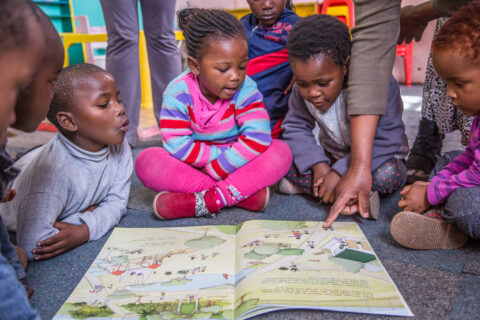The South African Schools Collection
How To Choose A Career At School
There is no doubt that older generations had an easier task when it came to choosing a vocation. ‘Our parents grew up with predictable jobs,’ confirms Antoinette Cook, an educational psychologist based at Penryn College in the Lowveld, but the world of work has changed.
Cook is currently completing her PhD in improving the ways in which school children are supported during the critical process of career choice, and it’s an area in which she feels most South African schools are lacking.
‘Children are no longer choosing a career for life,’ she says. ‘They have to become lifelong learners’, adapting to global technology and constant change. This means the job market is as vast and malleable as your own imagination, but it’s also more difficult to settle on a course of study. One of the more informal ways in whichparents can help to ease their children through this process, explains Cook, is to start when they are young, by simply talking about what mom and dad do for a living. You’d be surprised how little children know about your job, she adds.
Parents can also assist by helping to find their child’s interests and then developing them. ‘If your child displays nurturing qualities, suggest volunteer work at the local SPCA. It’s about helping to develop your child’s narrative from the start, but be careful of channelling their energies in one direction. Let them make their own journey of self-discovery.’
Cook’s work is based on concepts taught by Professor Mark Savickas, who uses the phrase ‘life design’. It’s the notion that a few test scores can never encapsulate a person’s essence; it’s more of a lifelong experiment.
Hence, aptitude and personality tests still play a key role, but they are no longer the only methods of determining a child’s potential. ‘Different professionals will have different approaches,’ says Cook, and parents should tap in to the expert resources in their communities.
Start with the most obvious: your child’s teachers. Educational psychologists, school guidance counsellors, life coaches and tertiary-institution counselling centres can also provide pertinent information.
‘Universities that offer psychology degrees have Masters students who counsel as part of their post-graduate training, often at reduced rates, so this is an excellent opportunity to seek professional career guidance,’ suggests Cook.
Start in Grade 9.
Remember that your child’s career path formally starts in Grade 9, when they make their Grade 10 subject choices. It’s worth seeking professional guidance at this point already, and consider contacting a few tertiary institutions to enquire about admission requirements.
Selecting the correct subjects for Grade 10 is merely one stepping stone; your child must then meet the minimum requirements in Grade 12 as determined by the Admission Points Score system (APS), explains Cook. Different courses have different requirements, so it’s best to contact your chosen institution and find out what these are.
Many courses also require a learner to have written the National Benchmark Tests (NBT), to gain a placement in a particular course. These tests are not necessarily performed as a matter of course at school, but for some courses they are a prerequisite. Register at Nbt.ac.za.
Choosing a path
There is a vast array of study options available in South Africa; it’s a matter of deciding what to study, and then determining where your child will be best suited, and what is financially viable.
“This is one of the reasons why cabinet mandated the Department of Higher Education and Training to implement a national career development service,” says Letshego Mokeki, project manager of career development services (CDS) for the DHET. The CDS website has an extensive list of career options, with easy click-through links detailing what you need to qualify, and where to study.
“CDS further runs the National Career Advice Portal (NCAP),” adds Mokeki. Register for free at ncap.careerhelp.org.za, and complete a questionnaire to narrow your options.
The Organising Framework for Occupations in SA currently lists about 1 500 occupations, according to Letshego Mokeki, project manager of CDS.
Making a mistake
It’s inevitable that some children will regret certain choices. If either the parent or the child is feeling overwhelmed, it’s important to reach out to professional support services, suggests Cook.
The emotional component cannot be overlooked, and how a parent handles this is vital. ‘Don’t make your child feel like a failure,’ warns Cook. “Explore the alternatives together. It doesn’t have to be a disaster,” but try to find solutions before pulling the plug.
Mind the gap
Gap years seem to be a dirty word for some parents, but they are worth investigating.
“There are structured gap years,” suggests Cook, many of which will allow your child to further explore their interests. Treverton College in the KwaZulu-Natal Midlands offers an inspired gap year (visit Treverton.co.za). Quest Africa (Quest-africa.co.za) offers a variety of courses covering interests such as game-farming, rock-climbing, business basics and public speaking. There are also organisations such as Lattitude (Lattitude.org.uk), offering charity-based volunteer programmes. Just make sure the year is spent productively, warns Cook, and that the organisation you use is credible.






 Sign-up and receive the Business Media MAGS newsletter OR SA Mining newsletter straight to your inbox.
Sign-up and receive the Business Media MAGS newsletter OR SA Mining newsletter straight to your inbox.